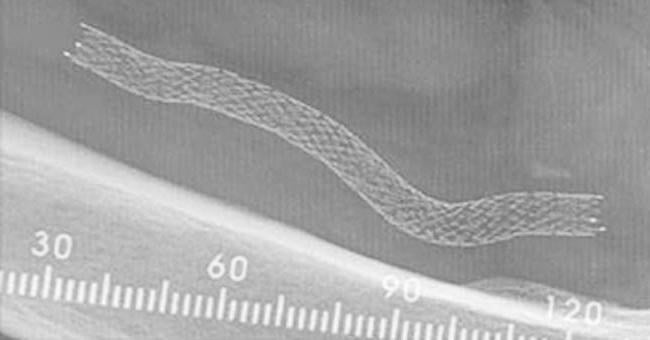
June 16, 2020 — The 36-month results from Veryan Medical’s MIMICS-2 study for the BioMimics 3D femoropopliteal stent showed low rates of revascularization and compared very favorably to current standards of care. The results were presented by Professor Thomas Zeller, M.D., University Heart Centre Freiburg, Bad Krozingen, Germany at the Charing Cross CX 2020 Live conference.
Zeller announced in the first presentation of the 36 month results, that the freedom from target legion revascularization (TLR) at 3 years for the BioMimics 3D stent was 81 percent. This is comparable to the outcomes for drug-coated balloons (DCB), drug-eluting stents (DES) and the self-expanding Supera stent. The vendor said the positive results were achieved even with treating more challenging lesions and without the need for lesion preparation. A sub-analyses presented showed that the TLR 3-year outcome was independent of the presence of severe calcium, total occlusions and long lesions.
MIMICS-2 is a prospective, single-arm, multi-centre clinical study to evaluate the safety and effectiveness of the BioMimics 3D Vascular Stent System in the treatment of patients with symptomatic atherosclerotic disease of the femoropopliteal artery.
Conducted under an FDA Investigational Device Exemption (IDE) with concurrence of the Japanese Pharmaceuticals and Medical Devices Agency (PMDA) under the FDA/PMDA Harmonization By Doing collaboration, MIMICS-2 enrolled 271 subjects undergoing femoropopliteal intervention across 43 investigational sites in U.S., Japan and Germany. Professor Zeller, along with Timothy Sullivan, M.D., Minneapolis, and Professor Masato Nakamura, Tokyo, Japan, is a co-Principal Investigator.
“These are reproducible, rigorous and high quality data from the U.S., Japan and Europe and we are delighted that the MIMICS-2 results reinforce those from our earlier MIMICS-RCT study in a larger, more challenging patient population," said Nick Yeo, Veryan’s CEO. "The outcomes are comparable to those reported for drug-eluting stents and drug-coated balloons and suggest that mobilizing natural swirling flow is an alternative anti-restenosis strategy to the use of antiproliferative drugs.
The BioMimics 3D stent has a unique three-dimensional helical shape, designed to impart natural curvature to the diseased femoropopliteal artery, promoting swirling flow and elevating wall shear, which has a protective effect on the endothelium.[1] The helical shape of the BioMimics 3D stent is also designed to facilitate shortening of the stented segment during knee flexion and mitigate the risk of stented segment compression causing localised strains that in a straight stent may lead to stent fracture and chronic vascular injury.[2,3]
For more information: www.veryanmed.com
References:
1. Zeller T. - Oral Presentation VIVA 2014
2. BH Smouse et al. Biomechanical Forces in the Femoropopliteal Arterial Segment Endovasc. Today, vol 4, no. 6, pp. 60-66, 2005.
3. Scheinert D et al. Prevalence and clinical impact of stent fractures after femoropopliteal stenting. J Am Coll Cardiol 2005;45:312-5 doi:10.1016/j.jacc.2004.11.026


 January 05, 2026
January 05, 2026 









